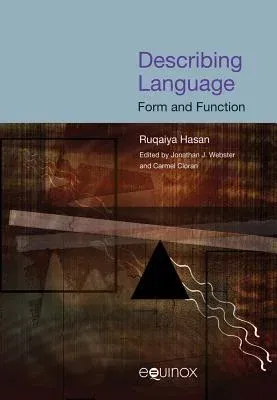Ruqaiya Hasan
(Author)Describing Language: Form and FunctionPaperback, 1 October 2017

Qty
1
Turbo
Ships in 2 - 3 days
In Stock
Free Delivery
Cash on Delivery
15 Days
Free Returns
Secure Checkout

Part of Series
Collected Works of Ruqaiya Hasan
Print Length
480 pages
Language
English
Publisher
Equinox Publishing (UK)
Date Published
1 Oct 2017
ISBN-10
1904768423
ISBN-13
9781904768425
Description
Product Details
Author:
Book Format:
Paperback
Country of Origin:
US
Date Published:
1 October 2017
Dimensions:
23.39 x
15.6 x
2.03 cm
ISBN-10:
1904768423
ISBN-13:
9781904768425
Language:
English
Location:
Sheffield
Pages:
480
Publisher:
Weight:
539.77 gm